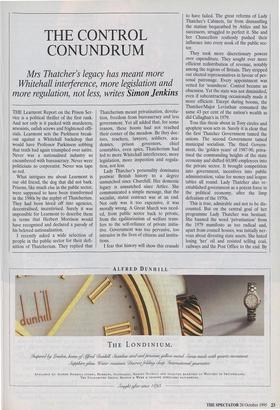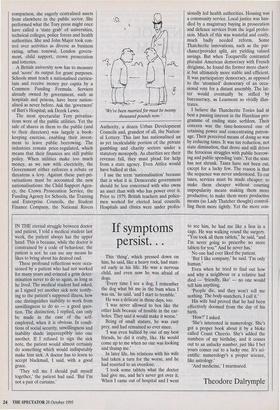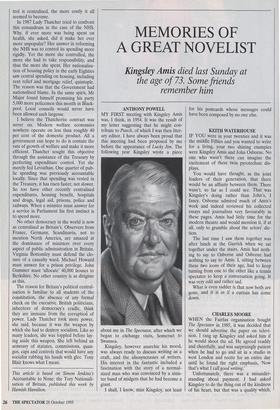THE CONTROL CONUNDRUM
Mrs Thatcher's legacy has meant more Whitehall interference, more legislation and
more regulation, not less, writes Simon Jenkins THE Learmont Report on the Prison Ser- vice is a political thriller of the first rank. And not only is it packed with murderers, arsonists, oafish screws and frightened offi- cials. Learmont sets the Parkhurst break- out against a Whitehall backdrop that would have Professor Parkinson sobbing that truth had again triumphed over satire. Never was a nationalised industry so encumbered with bureaucracy. Never were politicians so corporatist. Never was tape so red.
What intrigues me about Learmont is our old friend, the dog that did not bark. Prisons, like much else in the public sector, were supposed to have been transformed in the 1980s by the zephyr of Thatcherism. They had been hived off into agencies, decentralised, incentivised. Surely it was impossible for Learmont to describe them in terms that Herbert Morrison would have recognised and declared a parody of his beloved nationalisation.
I recently asked a wide selection of people in the public sector for their defi- nition of Thatcherism. They replied that Thatcherism meant privatisation, devolu- tion, freedom from bureaucracy and less government. Yet all added that, for some reason, these boons had not reached their corner of the meadow. Be they doc- tors, teachers, lawyers, soldiers, aca- demics, prison governors, chief constables, even spies, Thatcherism had led to more Whitehall interference, more legislation, more inspection and regula- tion, not less.
Lady Thatcher's personality dominates postwar British history to a degree unmatched since Churchill. Her domestic legacy is unmatched since Attlee. She communicated a simple message, that the socialist, statist contract was at an end. Not only was it too expensive, it was morally wrong. A Great March was need- ed, from public sector back to private, from the egalitarianism of welfare trans- fers to the self-reliance of private initia- tive. Government was too pervasive, too intrusive in the lives of citizens and institu- tions.
I fear that history will show this crusade to have failed. The great reforms of Lady Thatcher's Cabinets, far from dismantling the statism bequeathed by Attlee and his successors, struggled to perfect it. She and her Chancellors restlessly pushed their influence into every nook of the public sec- tor.
They took more discretionary powers over expenditure. They sought ever more efficient redistribution of revenue, notably among the regions of Britain. They stripped out elected representatives in favour of per- sonal patronage. Every appointment was vetted for 'soundness'. Control became an obsession. Yet the state was not diminished, even if subcontracting occasionally made it more efficient. Except during booms, the Thatcher/Major Leviathan consumed the same 43 per cent of the nation's wealth as did Callaghan's in 1979.
Toss this thesis about in Tory circles and apoplexy soon sets in. Surely it is clear that the first Thatcher Government tamed the unions. The second Government tamed municipal socialism. The third Govern- ment, the 'golden years' of 1987-90, priva- tised the commanding heights of the state economy and shifted 60,000 employees into the private sector. It brought competition into government, incentives into public administration, value for money and league tables all round. Lady Thatcher also re- established government as a potent force in the political economy, after the limp defeatism of the 1970s.
This is true, admirable and not to be dis- counted. But on the central goal of her programme Lady Thatcher was hesitant. She banned the word 'privatisation' from the 1979 manifesto as too radical and, apart from council houses, was initially ner- vous about divesting state assets. She hated losing 'her' oil and resisted selling coal, railways and the Post Office to the end. By comparison, she eagerly centralised assets from elsewhere in the public sector. She performed what the Tory press might once have called a 'state grab' of universities, technical colleges, police forces and health authorities. She and John Major took con- trol over activities as diverse as business rating, urban renewal, London govern- ment, child support, crown prosecution and lotteries.
A British university now has to measure and 'score' its output for grant purposes. Schools must teach a nationalised curricu- lum and receive money per capita by a Common Funding Formula. Services already owned by government, such as hospitals and prisons, have been nation- alised as never before. Ask the 'governors' of Bart's Hospital; ask Derek Lewis.
The most spectacular Tory privatisa- tions were of the public utilities. Yet the sale of shares in them to the public (and to their directors) was largely a book- keeping exercise, enabling their invest- ment to leave public borrowing. The industries remain price-regulated, which means that their finances are still public policy. When utilities make too much money, as we saw with electricity, the Government either enforces a rebate or threatens a levy. Against these part-pri- vatisations must be accounted the new nationalisations: the Child Support Agen- cy, the Crown Prosecution Service, the Funding Agency for Schools, the Training and Enterprise Councils, the Student Finance Company, the National Rivers `We've been married for must be twenty thousand pounds. now.'
Authority, a dozen Urban Development Councils and, grandest of all, the Nation- al Lottery. This last has nationalised an as yet incalculable portion of the private gambling and charity sectors under a statutory monopoly. As charities see their revenue fall, they must plead for help from a state agency. Even Attlee would have balked at this.
I use the term 'nationalisation' because that is what it is. Democratic government should be less concerned with who owns an asset than with who has power over it. Prior to 1979, British teachers and police- men worked for elected local councils. Hospitals and clinics were under profes- sionally led health authorities. Housing was a community service. Local justice was han- dled by a magistracy buying in prosecution and defence services from the legal profes- sion. Much of this was wasteful and costly, much badly needed reform. Some Thatcherite innovations, such as the pur- chaser/provider split, are yielding valued savings. But when Tocqueville contrasted pluralist American democracy with French dirigisme, he found the former more chaot- ic but ultimately more stable and efficient. It was participatory democracy, as opposed to the 'atomised' democracy of an occa- sional vote for a distant assembly. The lat- ter would eventually be stifled by bureaucracy, as Learmont so vividly illus- trates.
I believe the Thatcherite Tories had at best a passing interest in the Hayekian pro- gramme of ending state serfdom. Their concern was the time-honoured one of retaining power and concentrating patron- age. Their perceived means of doing so was by reducing taxes. It was tax reduction, not state diminution, that drove and still drives the ferocious struggles with public borrow- ing and public spending 'cuts'. Yet the state has not shrunk. Taxes have not been cut, except for a lucky few. The reason is that the sequence was never understood. To cut taxes, services must be made cheaper; to make them cheaper without courting unpopularity means making them more productive; to make them more productive means (so Lady Thatcher thought) control- ling them more tightly. Yet the more con- trol is centralised, the more costly it all seemed to become.
In 1987 Lady Thatcher tried to confront this conundrum in the case of the NHS. Why, if ever more was being spent on health, she asked, did it make her ever more unpopular? Her answer in reforming the NHS was to control its spending more rigidly. Yet the more she controlled, the more she had to take responsibility, and thus the more she spent. Her nationalisa- tion of housing policy in the early Eighties saw central spending on housing, including rent relief and mortgage relief, quintuple. The reason was that the Government had nationalised blame. In the same spirit, Mr Major found himself promising his party 5,000 more policemen this month in Black- pool. Local councils would never have been allowed such largesse.
I believe the Thatcherite contract was never on. Modern welfare economies nowhere operate on less than roughly 40 per cent of the domestic product. All a government can hope to do is contain the rate of growth of welfare and make it more efficient. Thatcher sought this objective through the assistance of the Treasury by perfecting expenditure control. Yet she merely fed Leviathan. One quarter of pub- lic spending was previously accountable locally. Since that spending was vested in the Treasury, it has risen faster, not slower. So too have other recently centralised expenditures, housing benefit, hospitals and drugs, legal aid, prisons, police and railways. When a minister must answer for a service in Parliament his first instinct is to spend more.
No other democracy in the world is now as centralised as Britain's. Observers from France, Germany, Scandinavia, not to mention North America, are amazed at the dominance of ministers over every aspect of public administration in Britain. Virginia Bottomley must defend the clo- sure of a casualty ward. Michael Howard must answer for a prison privilege. John Gummer must 'allocate' 40,000 houses to Berkshire. No other country is as dirigiste as this.
The reason for Britain's political central- isation is familiar to all students of the constitution, the absence of any formal check on the executive. British politicians, inheritors of democracy's cradle, think they are immune from the corruption of power. Lady Thatcher took more power, she said, because it was the weapon by which she had to destroy socialism. Like so many leaders, she was toppled before lay- ing aside this weapon. She left behind an armoury of statutes, commissions, quan- gos, caps and controls that would have any socialist rubbing his hands with glee. Tony Blair knows what I mean.
This article is based on Simon Jenkins's Accountable to None: the Tory Nationali- sation of Britain, published this week by Hamish Hamilton.




































































 Previous page
Previous page